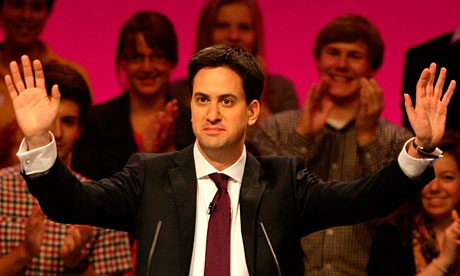
As Ed Miliband just about squeaked past his brother to become Labour leader and gave his first ever leaders speech he seems to have made the break with New Labour, if we take his words at face value New Labour has gone, and a more traditional social democratic, union friendly one headed by him has taken its place. Instead of laying down a middle ground and staying there, he seems to be re-establishing a more traditional Labour manifesto. There was the admission that Iraq was a mistake, that tuition fees are bad, that a rampantly free market City was also no longer flavour of the month either. He offered the hand of friendship to the unions, but warned against militancy for militancy's sake as not to be tolerated. In short it was a most tacit embrace of social democracy that has been seen by the party since the nineties and the Labour traditionalists seemed to like what they heard. Gone are the days when it seemed like Tony Blair was only half comfortable with his party and almost disliked the older elements of the labour movement and tried to distance himself from them. When it seemed that New Labour was almost ashamed to admit any association with social democracy. Gordon Brown may have been more tribal at heart, but the financial crisis derailed everything, and the plain fact of a government having spent over a decade in power meant that he had really run out of steam in reasserting this sort of thing. But it seems today that this is the way forward for the party.
But is it risky? In one sense no. The party probably lost most of its floating support through the credit crunch and apathy after 13 years in office. But equally the Labour core vote was frittered away quite liberally with what they saw as an abandonment of them for the more middle class, swing voters. It may have been a necessary shift in values 13 years ago, but it put a lot of people out. I'm sure there was more than one red rose wearing MP candidate trudging dejectedly through a former northern mill town, at the less than enthusiastic response from once core voter bases this last election. I'm sure this is some ways an attempt at rapprochement with the disenfranchised arms of the party and voters, to shore up the core vote again. But what of getting votes further afield? In some ways Labour leaders were sort of keen to distance themselves from the kind of policies above because they thought that they lost votes. there was a strong feeling that in '87 and '92 that the Thatcher loving parts of the press had pilloried them for their policies, and the public had got swept up with this. But it is a little different now. The unfettered free market is seen as a major villain in causing the credit crisis in the publics eyes. The Coalition is hardly all that popular, and talk of the "big society" are a telling euphemism of this. Is Ed Miliband planning on greater public sentiment for social democracy in the face of ConDem spending cuts, and the cold winds that they potentially may bring with them? That they can poach worried public sector workers and disgruntled Lib Dems sidelined by the coalition compromises that as the junior partner; they bear the brunt of?
It is an interesting dichotomy building up. On the one hand the coalition wants spending cuts to bridge the deficit. It is of course - partly ideological. The Tory front benchers are stuffed with instinctive small government believers, steeped in hard Thatcherism. Considerable swathes of the public sector are seen in their eyes as an obstacle to hard core monetarist prosperity, and a socialist affront to got rid of. Ostensibly purging them in the name of spending cuts is a plum opportunity to do so, and I think a lot of the electorate have twigged onto this. By positioning themselves as a counterweight to a government looking downwards to cut their way to economic strength, as a government willing to shore from the bottom up, against the worst excesses of the free market, stabilising the economy from the ground up, and hopefully catch some Lib Dems who may want to fall off the spending cuts boat. Positioning Labour as an ideological counterweight to who has the most apt economic recovery plan.
Interesting times ahead whatever happens, and perhaps a move away from the centre ground seeking.

No comments:
Post a Comment